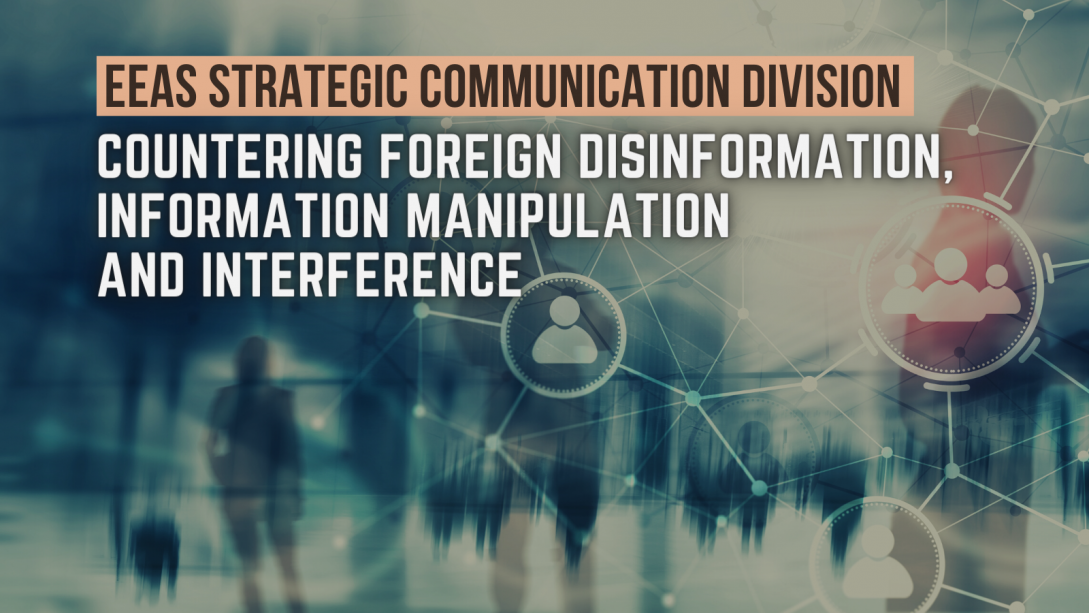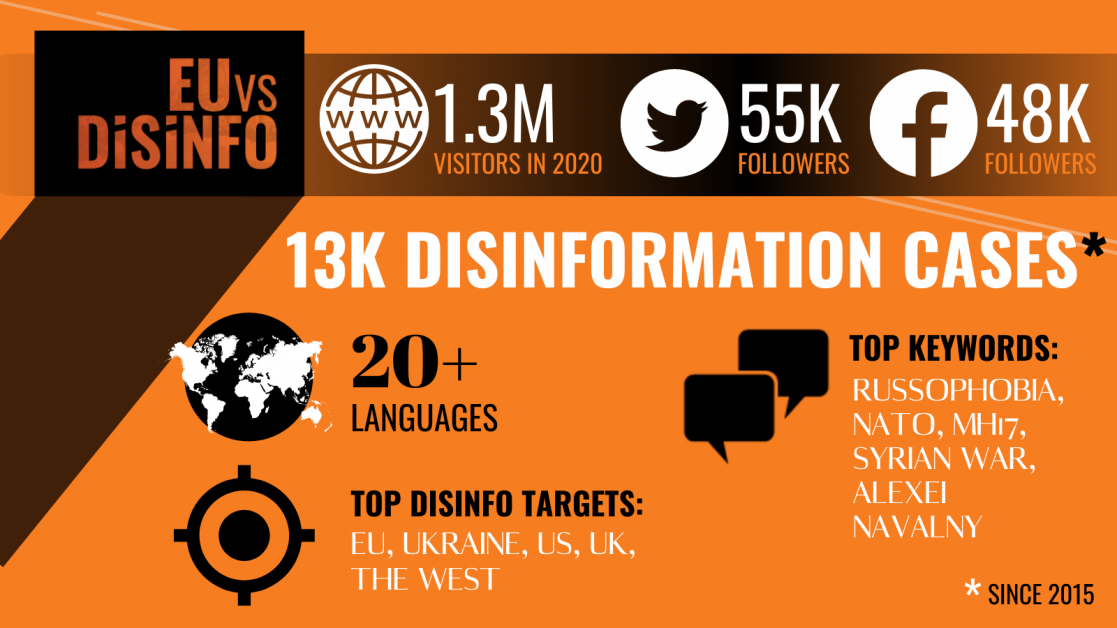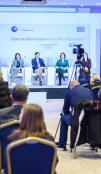Tackling disinformation: Information on the work of the EEAS Strategic Communication division and its task forces (SG.STRAT.2)

The EEAS Strategic Communication Division and its Task Forces (STRAT.2) is placed within the Directorate for Strategic Communication and Foresight of the EEAS. The Division is leading the work on addressing foreign disinformation, information manipulation and interference and has a mandate to analyse the information environment in order to enable EU foreign policy implementation and protect its values and interests.
In addressing foreign disinformation, information manipulation and interference, the Division is developing and implementing targeted approaches to communicate and engage with audiences in geographic priority regions, mostly in the EU’s neighbourhood. These strategic communications efforts support EU policy implementation and the EU’s strategic interests in these regions. For this pro-active strategic communications work, the team combines a unique regional and language expertise with policy development, communication actions and data analysis to make the EU’s voice heard and provide factual information about the EU’s policy. The campaigns-based approach to communications comes hand in hand with strategic engagements, support to independent media and organised civil society, as well as trainings to EU Delegations and public communicators.

Throughout the pandemic, the EEAS Stratcom Division has released public reports on COVID-19 disinformation, information manipulation and interference, covering activity by Russia, China and other relevant foreign actors. This is part of the EEAS’ mandate to raise awareness of such activity in the public.
In its work, the Division cooperates closely with other EU institutions, Member States and international partners like the G7 and NATO, as well as with civil society organisations, researchers, journalists, media and private industry.
The mandate of EEAS Stratcom Division and its Task Forces is spelled out in a number of Council Conclusions. The original mandate for the East Stratcom Task Force stems from the European Council in March 2015. The Western Balkans Task Force and the Task Force South were subsequently set up to address similar threats in these two priority regions. The work of the whole Division has been further enhanced since 2015 to address the rapidly changing nature of the threat.
In December 2019, the General Affairs Council Conclusions with regard to the work of EEAS StratCom to tackle foreign disinformation, information manipulation and interference, confirmed the following three work strands: (1) pro-active communication and awareness raising, (2) support to independent media and (3) detect, analyse and challenge such activities of the threat actors. It explicitly broadens the mandate to new threat actors and geographic regions.
THE DIVISION HAS MULTIPLE OBJECTIVES.
- Its work strengthens the EU’s situational awareness of the tactics, techniques and procedures used by foreign actors to engage in disinformation, information manipulation and interference.
- It also develops policies, strategies and instruments to respond to the threat foreign disinformation, information manipulation and interference poses to the functioning of the EU’s democracies, security and the implementation of its policies. The aim is to put in place a comprehensive, sustainable and effective framework to tackle the threat in a whole-of-society approach
- Through awareness raising, strategic communications, civil society empowerment and support to independent media and media literacy, the Division contributes to building resilience against foreign disinformation, information manipulation and interference.
- The Division also uses its unique strategic communications, languages and regional expertise in local contexts to support the EU’s civilian missions and operations and EU Delegations.
- Its work on improving their capacity to address foreign disinformation, information manipulation and interference extends to partnerships with governments, media and civil society of neighbouring countries.
- Lastly, in all its efforts, the Division aims to build local capacity as well as international alliances and contributes to a shared understanding of and coordinated response to the threat.
The Division’s Structure

The Division comprises different teams. The Policy, Strategy and Global Priority Issues Team (PSG) deals with strategy and policy development, emerging threats, cooperation with Member States (including on Rapid Alert System on Disinformation) and international partners as well as other stakeholders. The Information Analysis, Open Source and Data Strategy Team works on analysis and assessment of the information environment, the development of sound and scalable methodology as well as analytical cooperation. The three Strategic Communications Task Forces cover the geographic priority regions in the EU’s Neighbourhood and Western Balkans.
The Policy, Strategy and Global Priority Issues Team (PSG)

The team works on issues and topics that cut across different regions and actors, working closely with the three Task Forces and the Information Analysis team. In particular, it works on policy and strategy development, such as the implementation of the European Democracy Action Plan. The team is coordinating the cooperation with EU and international partners. As such, it is in charge of managing the EU’s Rapid Alert System (RAS), which brings together EU Institutions and EU Member States to cooperate on tackling this threat. Additionally, a core element of EEAS Stratcom’s approach is the close cooperation with international partners, most notably NATO and the G7 Rapid Response Mechanism (RRM), but also bilaterally with likeminded countries and international networks.
When it comes to emerging foreign actors engaged in disinformation, information manipulation and interference, “EU-China: A Strategic Outlook” identifies China’s activities in that regard as a challenge that needs to be addressed. EEAS Stratcom’s work on China aims to increase the situational awareness and understanding of the methods of disinformation, information manipulation and interference by China outside of its borders. This is reinforced through regular exchanges with civil society and likeminded partners and feeds into designing responses to Chinese manipulative activities, ranging from policy development to exposure and awareness raising.
The team also works to strengthen the EU’s Common Security and Defence Policy by providing targeted support and trainings to CSDP missions and EU Delegations outside the EU’s Neighbourhood and Western Balkans area, especially on the African continent. These entities are often exposed to foreign disinformation, information manipulation and interference, which also poses a physical security threat to the EU’s CSDP infrastructure and its policies and reputation. By both investing in a better situational awareness and operational resilience, EEAS Stratcom supports CSDP missions and EU Delegations in coping with the threat.
The Information Analysis, Open Source and Data Strategy Team

This team identifies, analyses and assesses foreign disinformation, information manipulation and interference and provides evidence-based recommendations to reduce their scope. It also further calibrates the EEAS’ methodological approach and capabilities by building on best practices and exchanges with stakeholders. This way, it establishes a thorough understanding of the threat landscape and the threat level, including the ever-evolving tactics, techniques and procedures employed by foreign actors. To this end, it cooperates with a wide range of partners, contributing to a shared methodological understanding and approach among EU Member States and engaging with civil society, the private sector and international partners.
The Division’s three geographic Task Forces
1. The East Stratcom Task Force

Since 2015, ESTF has been running the EUvsDisinfo (www.euvsdisinfo.eu) campaign to monitor, analyse and respond to pro-Kremlin disinformation, information manipulation and interference. The campaign’s flagship initiative is the database of pro-Kremlin disinformation cases, regularly updated and debunked.
The East Stratcom Task Force (ESTF) raises awareness about pro-Kremlin disinformation, information manipulation and interference, exposing attacks on the EU, its Member States and EU’s Eastern Neighbourhood. It couples direct responses such as exposure and awareness raising with proactive communication and promotion of European Union policies towards the Eastern Neighbourhood. This is done through multiannual integrated communication campaigns such as ‘Moving Forward Together’ (Ukraine), ‘Stronger Together’ (Moldova) or ‘EU for Georgia’. In close cooperation with the European Commission and EU Delegations, ESTF works to ensure communication coherence and resilience against disinformation, including, where relevant, through partnership with and support to government strategic communication offices. ESTF also pays increased attention to strengthening the overall media environment in the Eastern Neighbourhood and contributes to the provision of appropriate and needs-calibrated support for independent media in the region.
2. Western Balkans Task Force

Since 2019, the Western Balkans Task Force runs its yearly flagship campaign “Europeans making a difference”. Targeted at both EU and Western Balkans audiences, the campaign aims to reinforce the message of engagement and to contribute to a friendly and factual perception of the region in the EU. So far, “Europeans making a difference” has reached over 12 million people.
The Western Balkans Task Force (WBTF) is engaged in a full spectrum of strategic communications activities that support the implementation and understanding of the EU policy in the region. These take the form of public campaigns and strategic engagements with partners and stakeholders.
By practicing public and cultural diplomacy, WBTF seeks to go beyond traditional information channels and translates its actions into effective and varied communication products, all adapted to the local context and languages. The Western Balkans Task Force is engaged in monitoring, analysis and assessment of information environments, including disinformation, information manipulation and interference in the region. It also strengthens the support to representatives of civil society, including independent media and media organisations as well as fact-checking organisations. It actively engages with them, as part of a dedicated strategy to enable a pluralistic information environment and contribute to media literacy in the region.
3. The Task Force South

With a targeted campaign and explanatory video, Task Force South created a frontal and vocal response to disinformation and information manipulation by the Syrian regime and its allies against EU sanctions in Syria. The video sparked an online debate and allowed for the building of a digital coalition that changed the perception of the EU policy in the region that was based on false claims, but also facilitated the work of local multipliers engaged in countering such activity occupying a space that had been left to disinformation actors.
The Task Force South (TFS) promotes EU policy actions in the MENA region through strategic communications. It does so by designing proactive communication strategies and campaigns in close partnership with EU Delegations. TFS also helps fostering healthier information environments in the region, by facilitating support to independent media as well as contributing to civil society resilience against disinformation, information manipulation and interference. In particular, TFS designs and implements tailored systemic and tactical responses, most notably in Libya and Syria, using all means available in the Stratcom toolbox. The team also launched the pilot @EUinArabic account and supports Regional Media Officer to widen the EU proactive communications reach in Arabic.





